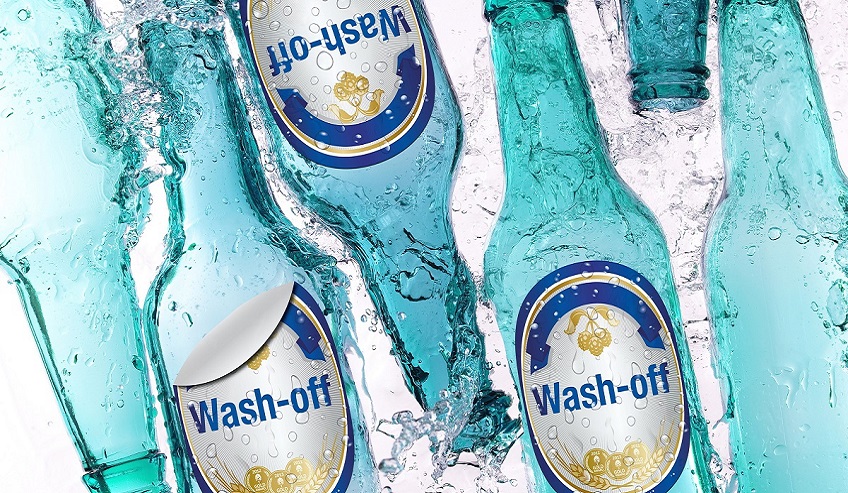
The Glue Talk Blog

Selecting the right labeling adhesive can increase container recyclability and re-use, as well as giving you a competitive advantage. Read on for my explanation of the labeling industry’s stand point on sustainability and how we are supporting the vision of a circular economy.
Reason 1: Recyclability
Our Fulltak™ SE 8301 is a high-performance, water-based, acrylic adhesive for alkali-strippable PSA paper labeling applications. It is ideal for recyclable bottles that require ice water resistance (IWR), followed by label removal in alkali wash-off operations. The range now includes a lower viscosity option for gravure coating machines. Fulltak™ SE 8301 is APEO-free and is designed for both paper and filmic labels with special film constructions, like shrinkables or perforated, which is a strong advantage as these are becoming increasingly popular.
Reason 2: Re-usability
Of course, it’s not just the beverage industry – labels are everywhere. Take, for instance, the containers used for supermarket meat and fruit. These trays often hold a paper logistics label, which must come off before the tray can be re-used. Often, the trays are cleaned only with water so it’s important that the label is produced with a wash-off adhesive. Our Fulltak™ SE 8302 and 8303 are established grades for cold water wash-off from a wide range of substrates, including glass and plastics. This reduces contamination and consumption of wash water as the adhesive remains attached to the label. New additions to this range are our APEO-free, low and high viscosity versions: TS 2815 and TS 2816.
Reason 3: Competitive advantage
Sustainability is an integral part of business strategy. Consumers are actively looking for information on how packaging supports recycling initiatives when selecting goods on the shelf or online. By using our extended and modernized product range for both alkali wash-off and cold water wash-off, you can increase your competitive advantage by proving your commitment to the circular economy.
Alkali vs. cold water wash off
The adhesive used will depend on the conditions the container will be exposed to. Continuing our example above, a beer bottle is often stored in refrigerated or iced water conditions. Once it’s taken out, the bottle is exposed to higher, ambient temperatures and condensation, both of which are a challenge for label adhesion. As a result, manufacturers have two choices:
1. A permanent adhesive, which hold labels in place firmly but can cause issues in recycling processes.
2. A peelable adhesive, which provides a lower environmental profile but risks labels coming off during refrigeration.
When it comes to removing the label, the wash-off process will depend on the chosen adhesive as some are removable with cold water and others in an alkali solution. In an ideal world, the adhesive would have ice water resistance and be simple to wash off.
Bearing all this in mind, here are my three reasons to make label wash-off a priority, and how connecting with the right adhesive expertise can make all the difference.
Reduce, re-use, recycle
Since the 1970s, one of the main approaches to sustainable development has been the circular economy. According to the Ellen MacArthur Foundation, there are three elements to this concept: design out waste and pollution, keep products and materials in use, and regenerate natural systems.
FEICA (The Association of the European Adhesive & Sealant Industry), of which we are an active member, is very much aligned with this point of view. They state that adhesives and sealants play an important role in the recycling and reuse of many products. And, this is something the labeling industry needs to think about.
As you know, almost all of the products we consume are labeled to provide information and guarantee consumer safety. For recycling, it’s important to differentiate between the individual elements of these products. In a plastic bottle, for example, the PET of the container needs to follow a separate recycling process to the paper or polypropylene label. Usually labels are incinerated or sent to landfill, but with the label removed, the container itself can be recycled, contributing to the circular economy.
Partner with us
Labels feature on virtually every consumer product, so it’s vital we give them the attention they deserve. Complex materials demand innovative adhesive solutions and by partnering with us you access solutions developed specially for a products’ entire life cycle.
Want to find out more? Contact us and we’d be happy to help.Blog Categories
Blog Categories
Archive
- 2024
- 2023
- 2022
-
2021
- January (3)
-
February (7)
- Celebrating Exceptional Service During COVID-19 Complications
- Cyanoacrylates: What They Are and What They Do
- Innovative two-shot bookbinding adhesive
- Make a Difference 2020
- Problem Solving: Paper Straws in Drinking Beverages
- Stronger straws sustainable future
- Substances of Interest in Disposable Absorbent Hygiene Products
- March (4)
- April (4)
- May (4)
- June (5)
- July (2)
- August (5)
- September (2)
- October (1)
- November (3)
- December (2)
-
2020
- January (4)
- February (2)
- March (3)
- April (4)
- May (3)
-
June (7)
- Community Support in the Era of Coronavirus
- HBFuller Employee Creates Face Shields with 3D Printer
- Improved Packaging Integrity and Greater Customer Satisfaction
- Liquid-Resistant Paper Straws
- What is a Sealant?
- What Is the Future of Commercial Disinfectants?
- Winning over consumers with e-commerce packaging solutions
-
July (6)
- Employees Take Action to be Part of Healing and Growth
- Gain a competitive advantage with packaging adhesive solutions
- HB Fuller Company Foundations Commitment to Communities
- Packaging Solutions for the South African Agriculture Market
- Supporting Organizations That Provide STEM Education for Youth
- Where Does Sustainability Stand Amid COVID-19
- August (3)
- September (2)
- October (4)
- November (2)
- December (4)
